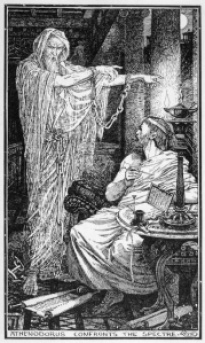 The Stoic philosopher Athenodorus Cananites (c. 74 BC – 7 AD) was personal tutor to the very first Roman Emperor, Augustus. He was himself a student of the greatest scholar of the Middle Stoa, Posidonius of Rhodes. Curiously, Athenodorus was reputed to have cleared a ghost from a haunted house. However, he was also known for employing a Stoic approach to anger management.
The Stoic philosopher Athenodorus Cananites (c. 74 BC – 7 AD) was personal tutor to the very first Roman Emperor, Augustus. He was himself a student of the greatest scholar of the Middle Stoa, Posidonius of Rhodes. Curiously, Athenodorus was reputed to have cleared a ghost from a haunted house. However, he was also known for employing a Stoic approach to anger management.
In his Moralia, Plutarch recounts the following anecdote:
Athenodorus, the philosopher, because of his advanced years begged to be dismissed and allowed to go home, and Augustus granted his request. But when Athenodorus, as he was taking leave of him, said, “Whenever you get angry, Caesar, do not say or do anything before repeating to yourself the twenty-four letters of the alphabet,” Augustus seized his hand and said, “I still have need of your presence here,” and detained him a whole year, saying, “No risk attends the reward that silence brings.” Plutarch, Moralia, Sayings of Romans: Caesar Augustus
This strategy of taking what modern therapists call a “time-out” before acting on feelings of anger was fairly well-known in the ancient world. However, Athenodorus gives a very clear example of how this was to be accomplished in practice: by pausing to recite the Greek alphabet before responding.
It must have worked, in On Anger, Seneca refers to Augustus as an example of someone who ruled without anger.
The late Emperor Augustus also did and said many memorable things, which prove that he was not under the dominion of anger. (3.23)
In the next section, he explains that Augustus was satisfied to leave the company of critics, without feeling the need to take revenge on them.
Let everyone, then, say to himself, whenever he is provoked […] Have I more authority in my own house than the Emperor Augustus possessed throughout the world? Yet he was satisfied with leaving the society of his maligner. (3.24)
Discover more from Donald J. Robertson
Subscribe to get the latest posts sent to your email.
